The modern workplace entails a multitude of protocols that guarantee the smooth operation of an organization and the satisfaction of its employees. One such critical point of interaction between employers and their employees is the timely disbursement of salaries. While most organizations usually disburse salaries according to established procedures and legal criteria, certain circumstances may arise where the employees are unable to collect their salaries personally. This may prompt the need for an authorization letter to collect salary, which assigns this task to a trusted agent who may collect the salary on the employee’s behalf. This comprehensive article aims to delve into the letter’s significance, its essential components, and useful tips to consider for its effective drafting.
How Authorization Letter Works for Salary Collection?
An authorization letter is an official document that authorizes another individual or entity to collect an employee’s salary or wages on their behalf. It is usually addressed to the Human Resource manager and contains the authorized agent’s information, a clear statement of authorization, and the reason behind this delegation. Such a letter becomes necessary when an employee is unable to personally collect their salary due to various factors, including travel, illness, personal commitments, or remote work situations. The letter not only streamlines the salary collection process but also highlights the importance of responsible financial management.
When You May Need an Authorization Letter
In situations where you are unable to collect your salary personally, you can designate a trusted agent to do so on your behalf with the help of an authorization letter. It conveys your explicit permission for someone else to collect your earnings on your behalf, ensuring timely receipt of your salary.
Below are some common scenarios in which you may require this authorization letter:
- When traveling for business or personal reasons, and your travel plan coincides with your salary payment date.
- Illness, injury, hospitalization, or any other medical emergencies might make it impossible to collect your wages personally.
- The letter can be useful when certain job obligations, assignments, or projects keep you away from the workplace when salaries are distributed.
- The letter can be especially useful if you work remotely or in a location far from your workplace.
- Sometimes, a court appearance or other legal proceedings may require you to delegate the task of collecting your salary to a trusted individual, such as a family member or a close friend.
- You may use the letter during extended periods of maternity or paternity leave. This accords you more time to focus on your family.
- Certain personal commitments, such as attending a wedding, family event, or any other important celebration, may prevent you from collecting your earnings on the designated date.
- If you are employed in a foreign country, language barriers may make it impossible for you to collect your salary yourself.
Essential Components of an Authorization Letter
An authorization letter to collect salary should include specific components to make it clear, formal, and legally enforceable. Discussed below are these essential components that should be included in such a letter:
Contact information and date
Start the letter by providing your full name and contact information. Provide your physical address, phone number, and email address to ensure seamless communication. Below this, provide the current calendar date to establish a timeline for the authorization. Including this information establishes your identity and allows for accurate record-keeping.
Recipient’s information
Below the date, include the recipient’s information. The letter is usually addressed to the Human Resources Manager or any other designated personnel. Provide their full name, official title, phone number, and email address. This ensures the recipient is aware that the letter is intended for them. It also showcases your respect for the protocols within your organization.
Subject and salutation
Next, provide a short, straightforward subject line such as “Authorization Letter To Collect Salary.” An informative subject line informs the recipient of the letter’s intended purpose. Below the subject line, provide a formal salutation such as “Dear Sir/Madam” or “Dear [Recipient Name] to address the recipient appropriately.
Authorization statement
In the first paragraph, provide relevant employment details, such as your full name, employee ID (if applicable), title, and supervisor’s name. Next, provide an explicit statement conveying your intent to grant a trusted individual or entity permission to collect your salary on your behalf. Remember to specify the salary period for which your agent is authorized to act. It can be for a specific date, a range of dates, or an ongoing arrangement. Your authorization statement should be clear and concise to ensure the recipient understands the letter’s purpose. You can also mention if the authorization is limited only to salary collection or if it extends to other tasks, such as signing related documents.
Reason for authorization
Next, outline your reasons for delegating this authority. Whether you work remotely, are on paternity leave, or are delayed by work commitments, the reason for authorization should be communicated. This provides additional context into your circumstances and enhances cooperation from the recipient.
Authorized representative’s details
Next, provide accurate and up-to-date information about the individual or entity you are granting the authority to collect your salary. Provide their full name and contact information, including physical address, phone number, and email address. If your authorized representative is a family member or friend, you may mention their relationship to you. Including this information facilitates the smooth transition of your responsibilities.
Reiterate your appreciation
In the final paragraph, express your appreciation to the recipient for their cooperation. Showing gratitude is a courteous way of acknowledging their assistance. This reinforces the positive relationship that exists between you and your employer.
Conclude the letter
Below the final paragraph, provide a respectful salutation such as “Yours Sincerely,” followed by your name and handwritten signature. By signing the letter, you consent to the authorization and contents of the letter. For added clarity, you may include a printed version of your name below the signature.
Witness or notary (if required)
If required by your jurisdiction or company’s policies, the letter may need to be notarized or signed in the presence of a witness. Notarization involves a notary public verifying the authenticity of your signature and the letter’s contents. Having the letter notarized or signed in the presence of a witness adds an extra layer of credibility.
Sample Letters
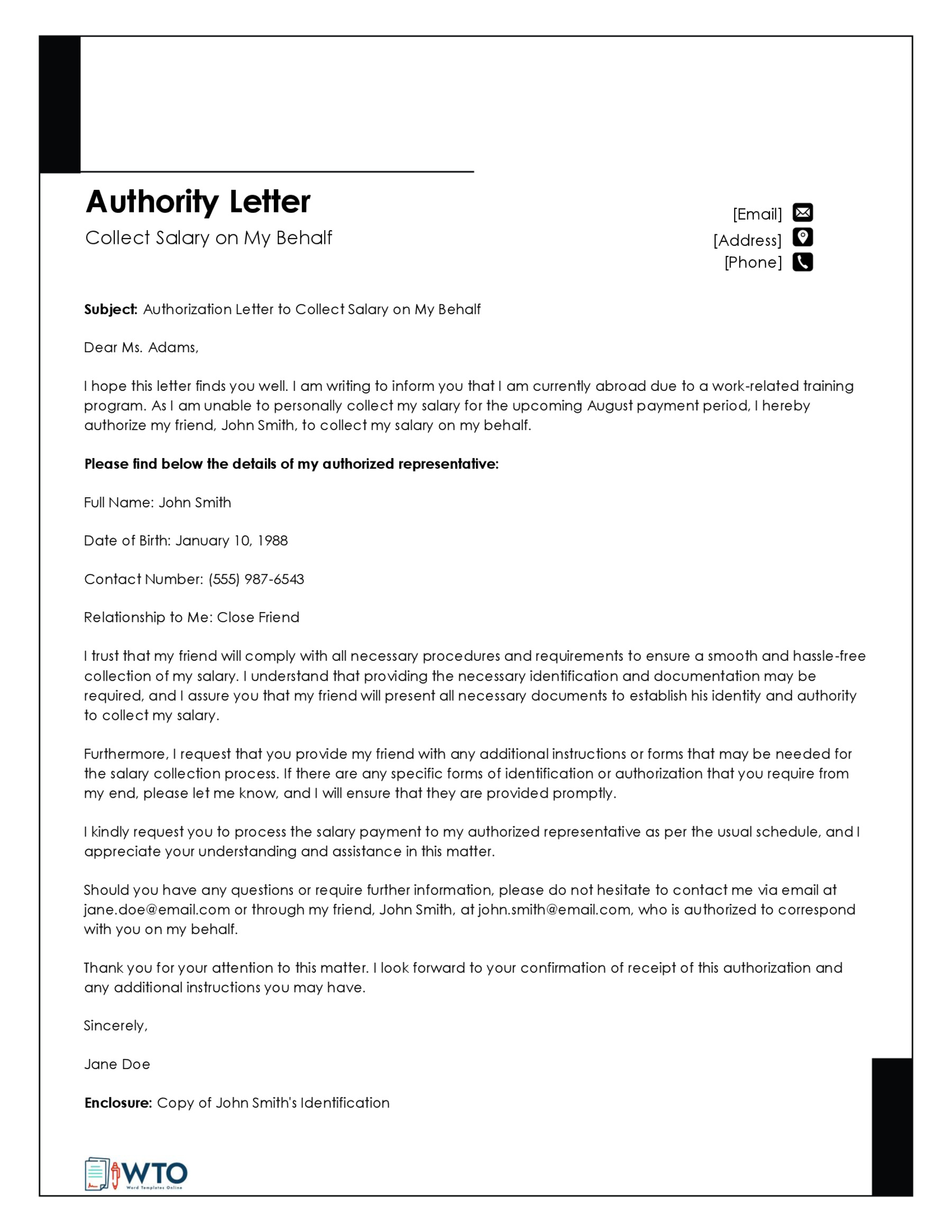
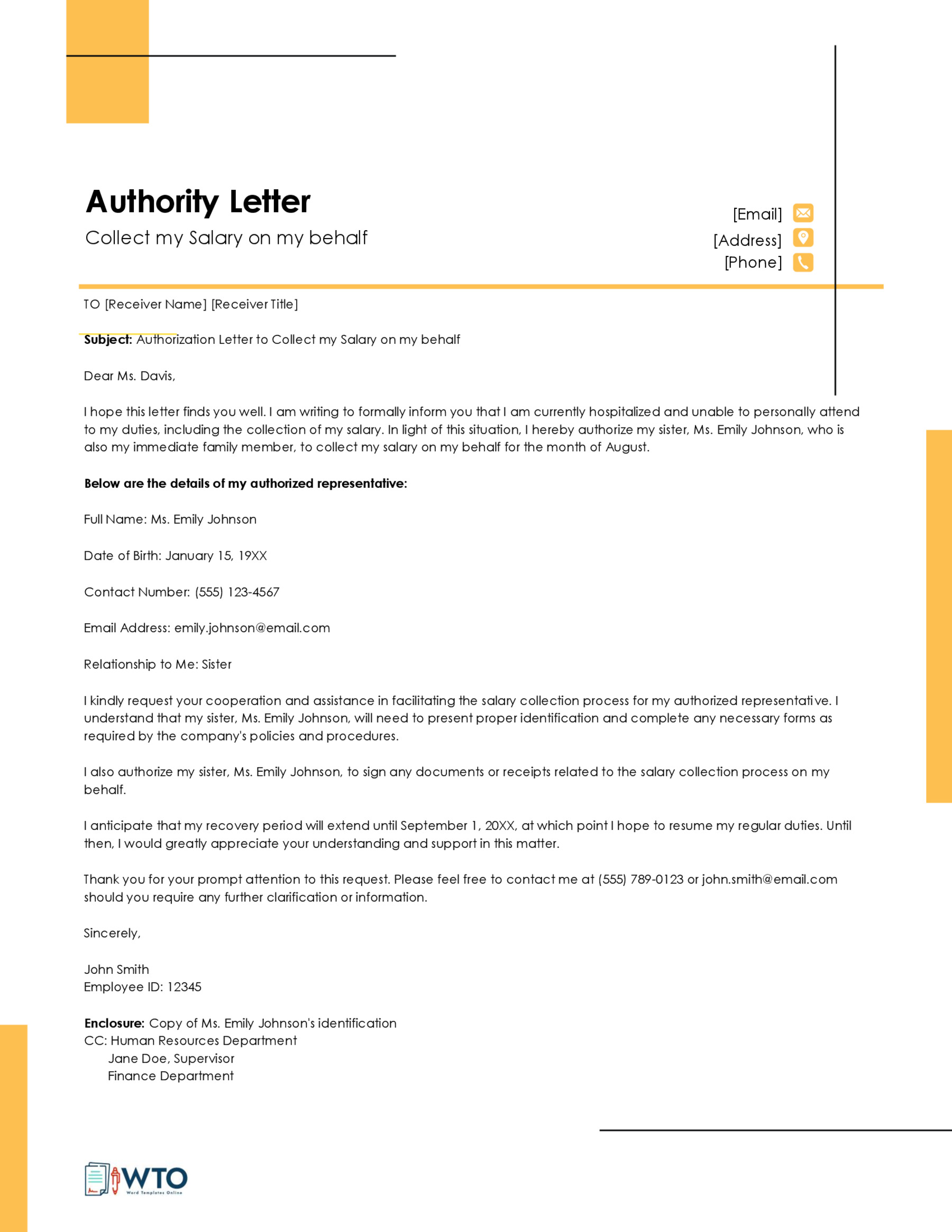
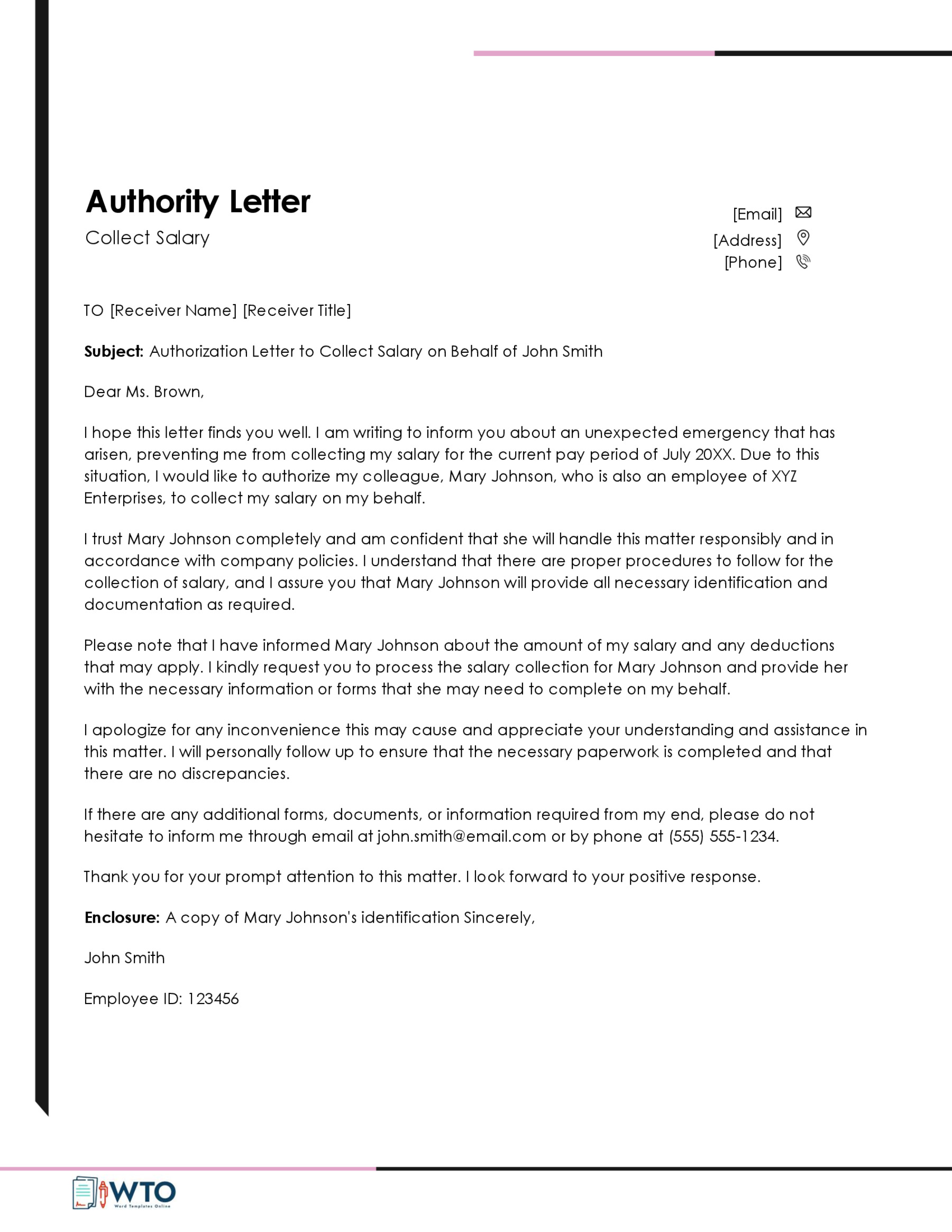
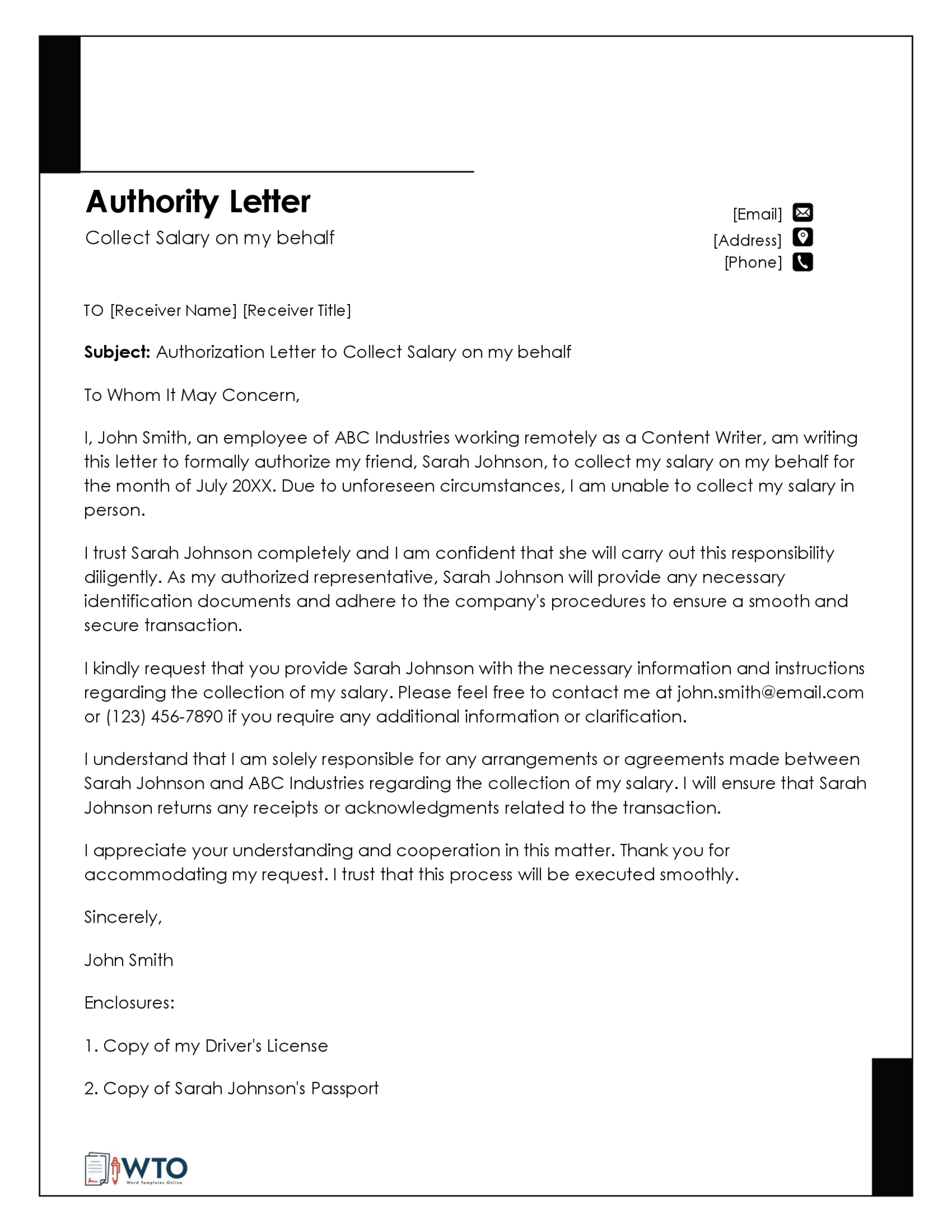
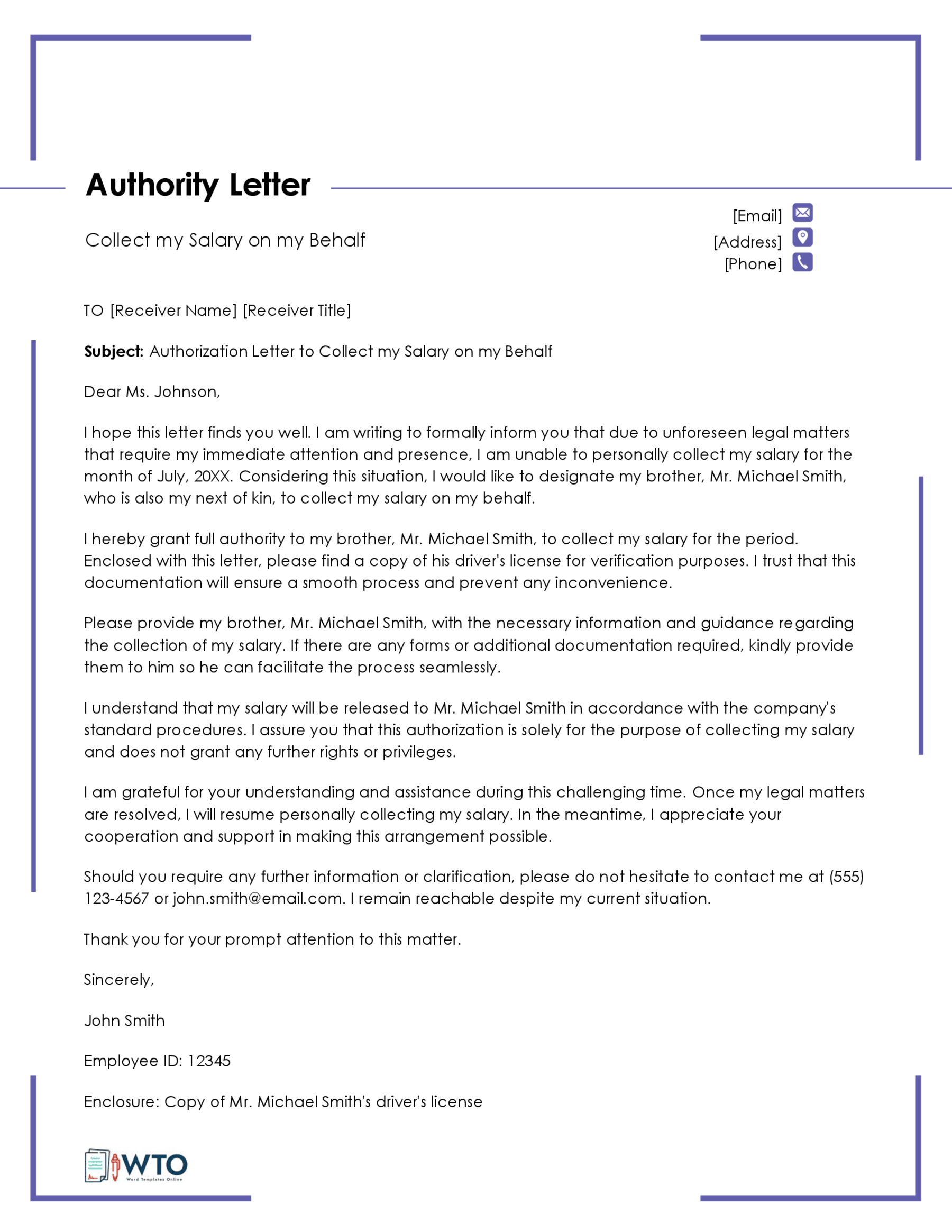
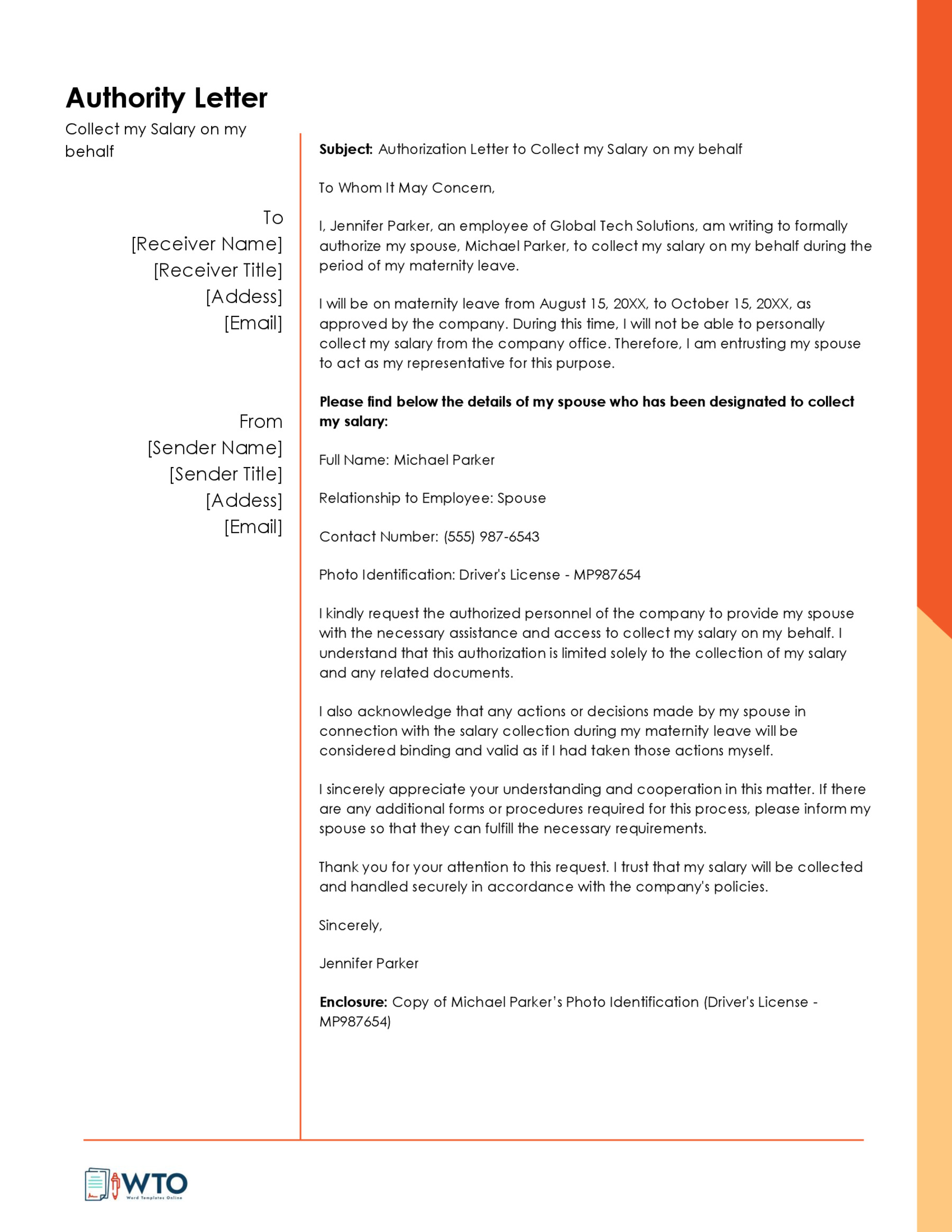
Letter Templates
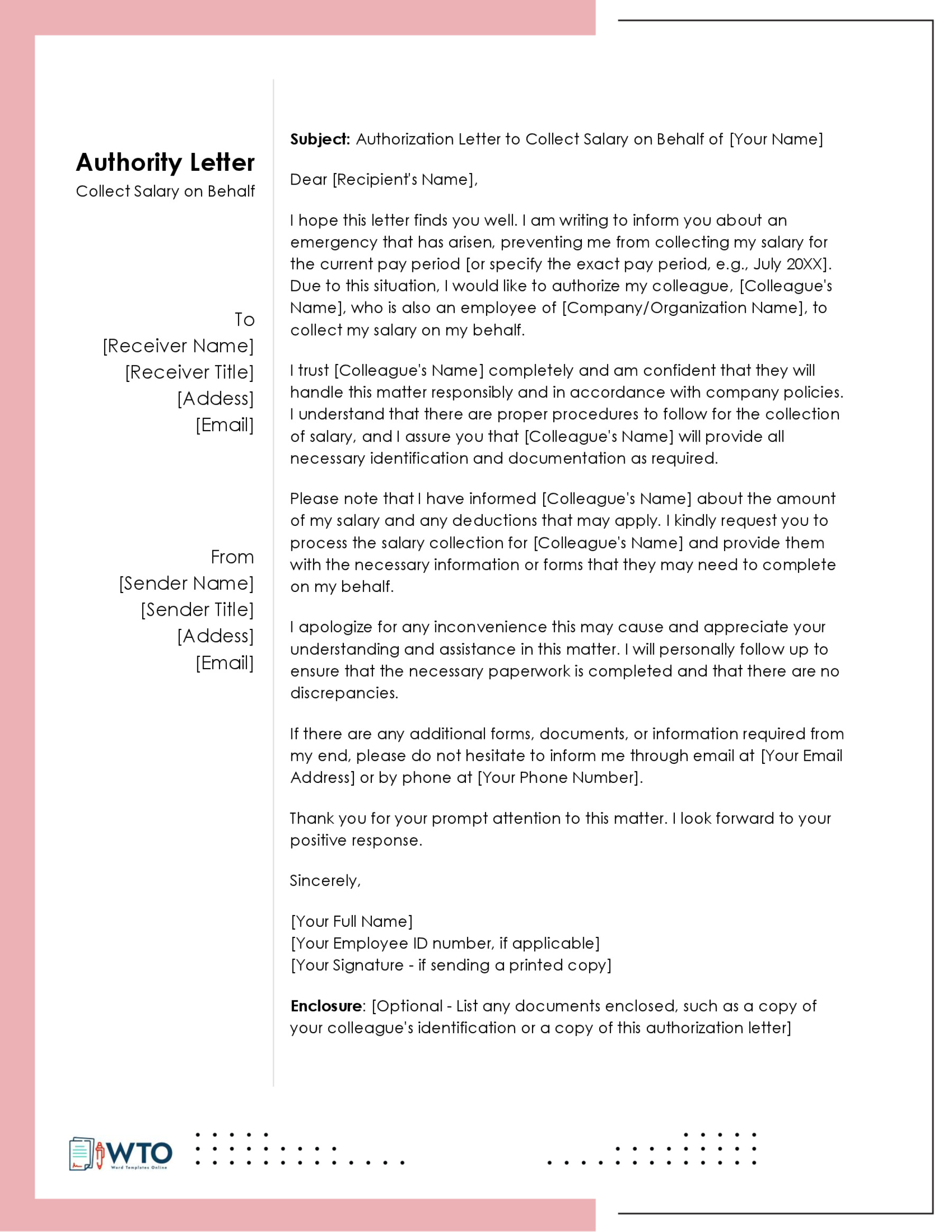
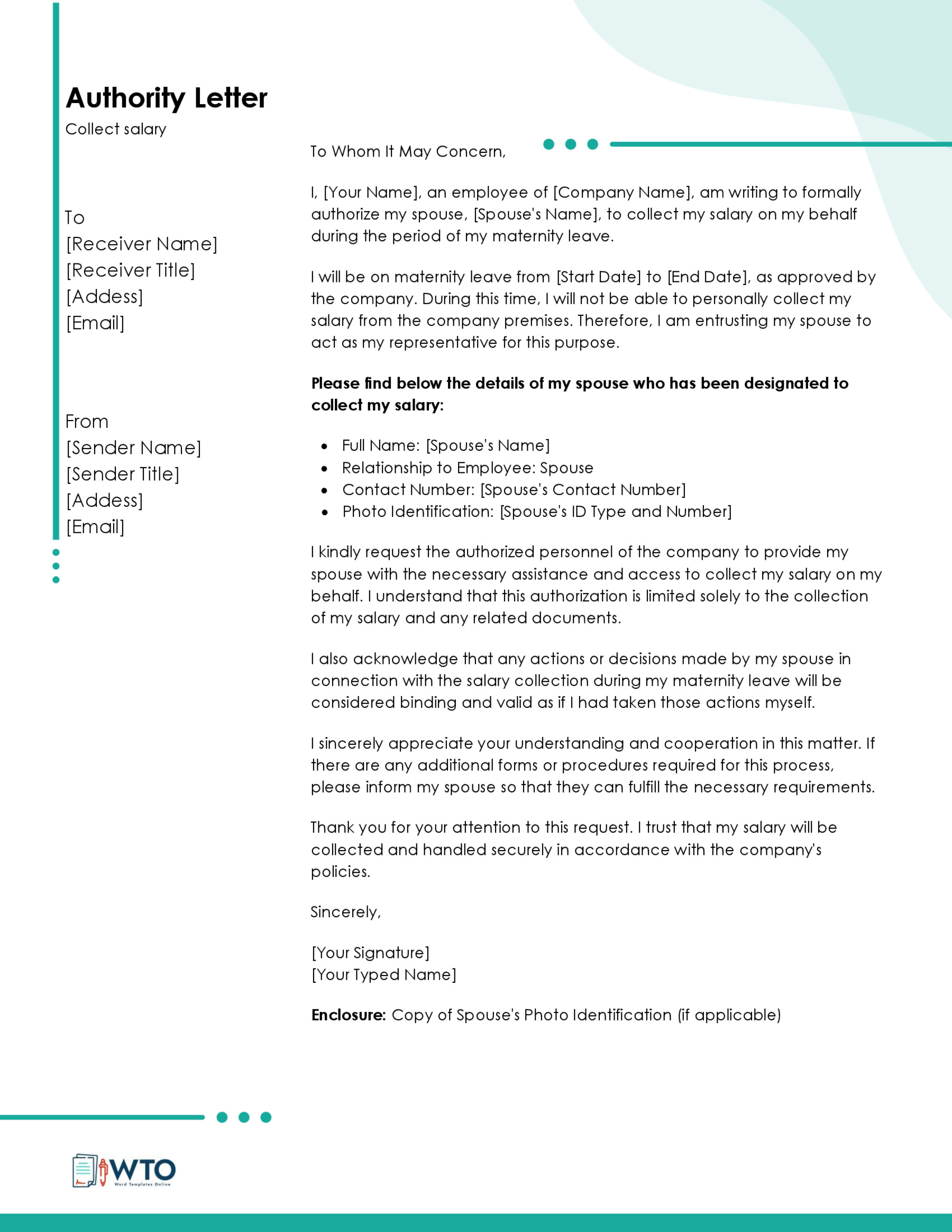
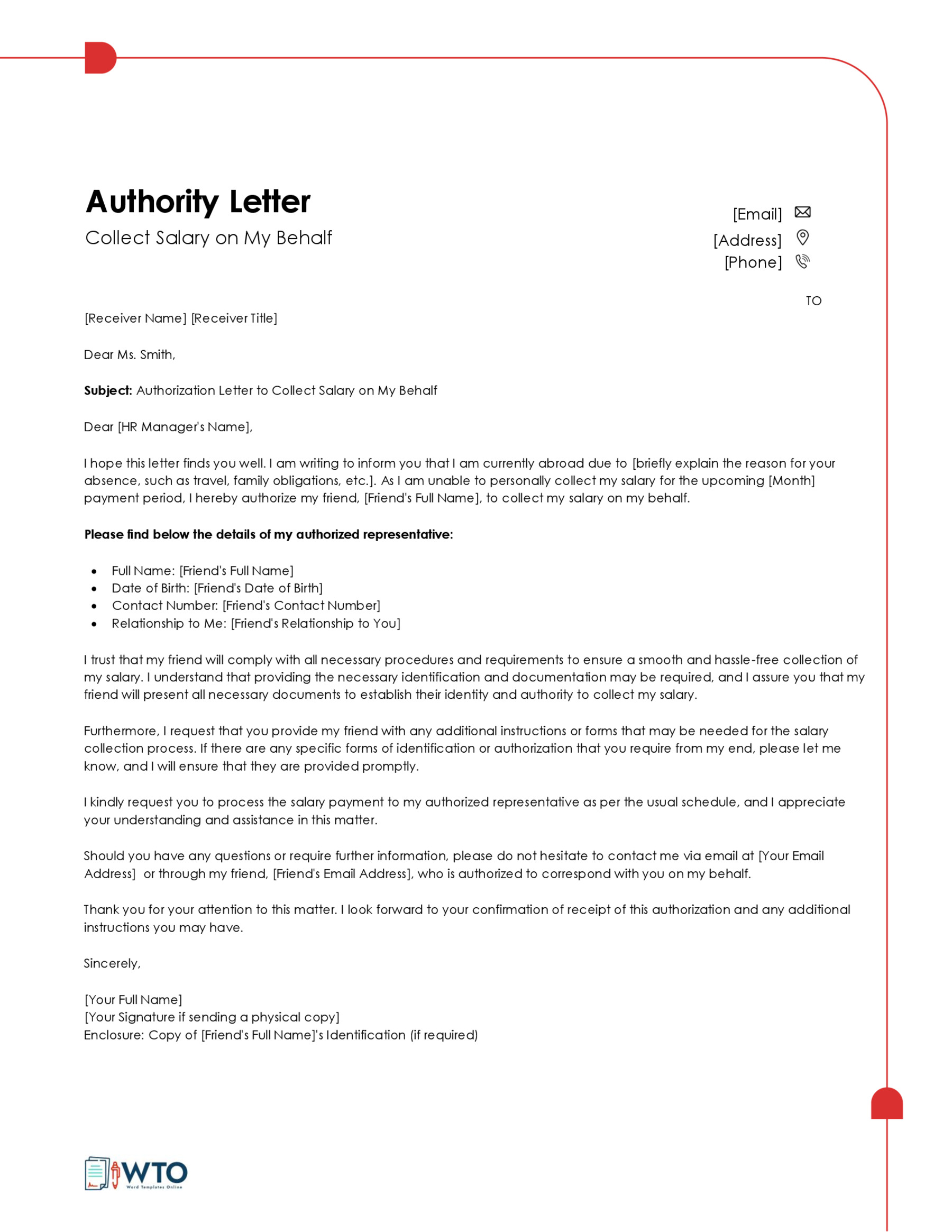
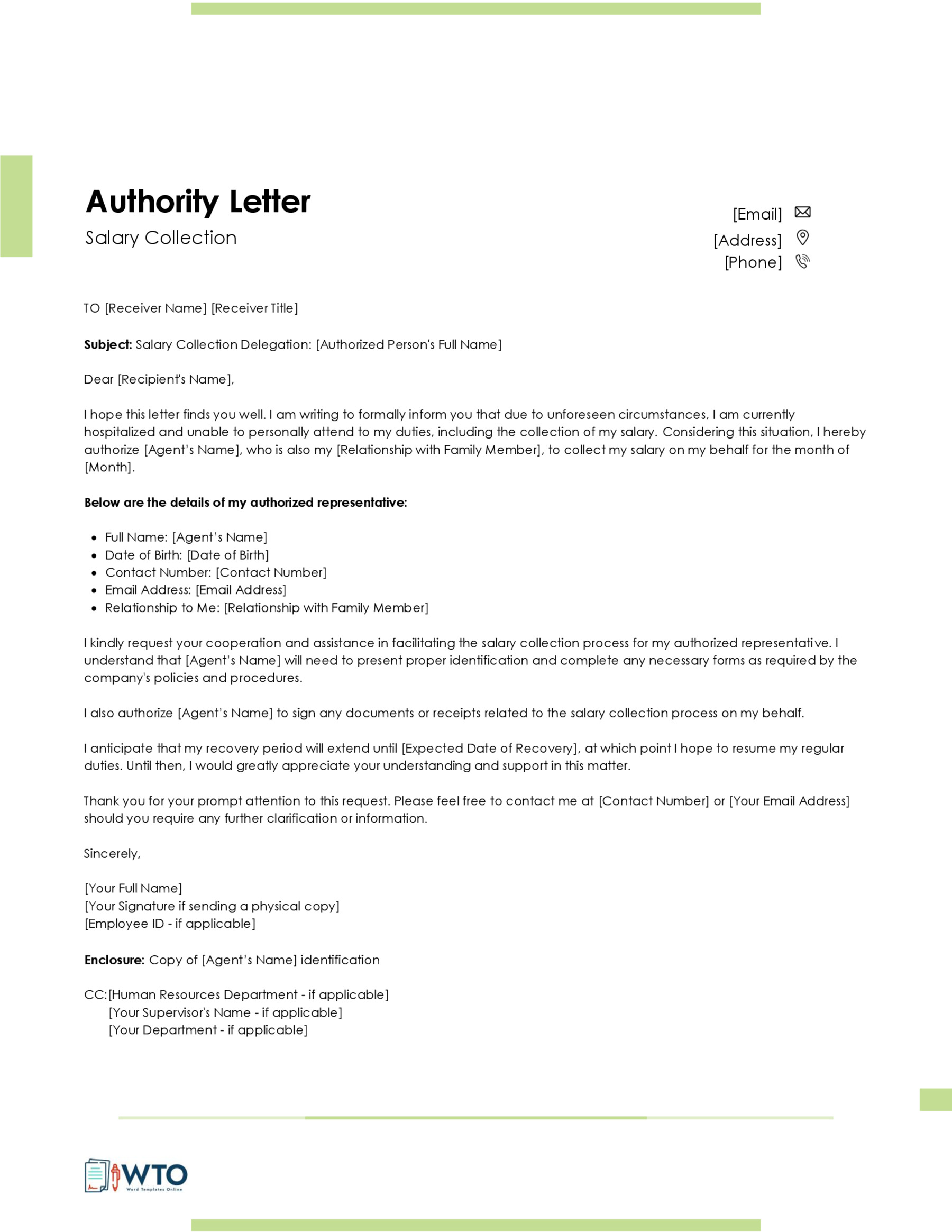
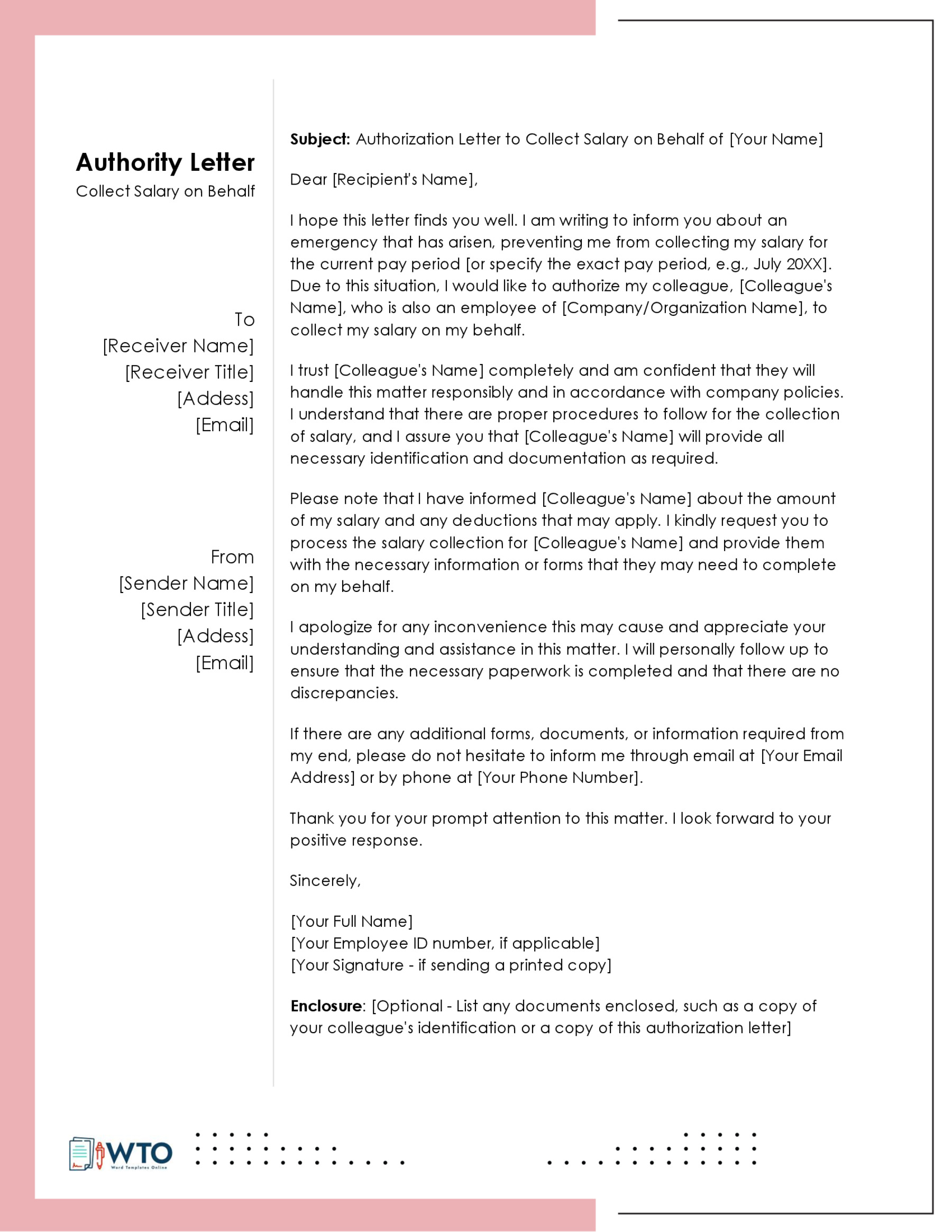
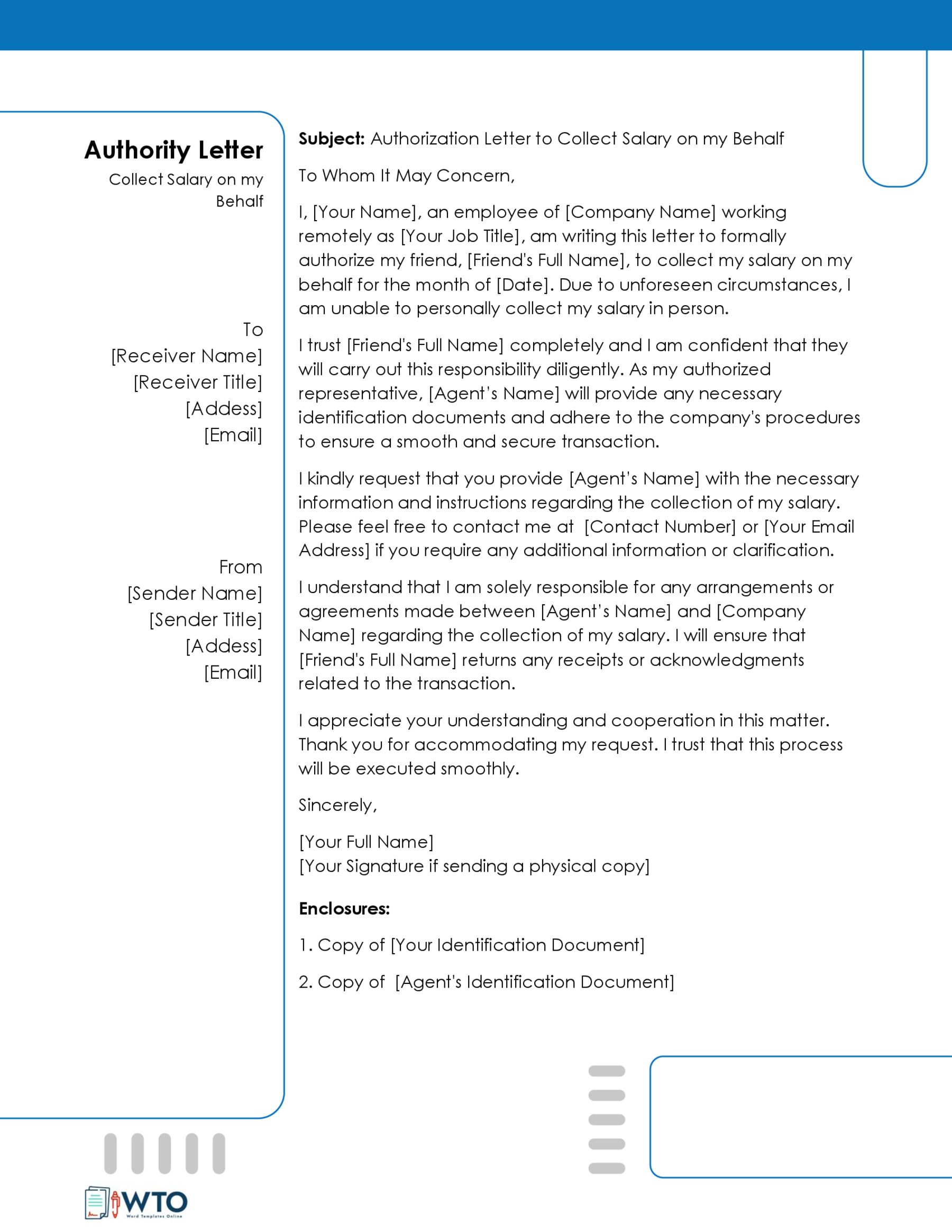
Tips for Crafting an Effective Authorization Letter for Salary Collection
An effective authorization letter not only serves its purpose but also reflects your adherence to regulations and attention to detail. By adhering to the tips outlined below, you can ensure your letter is clear and legally valid:
Clarity and conciseness
Ensure the contents of the letter are presented clearly and concisely. Explicitly state the purpose of the letter using simple and straightforward language. Avoid unnecessary jargon that may result in confusion or misunderstandings.
Formatting
When drafting the letter, follow a standard business letter format. The letter should have a professional look, with a clear heading, date, salutation, body, closing, and signature. The paragraphs should have sufficient spacing between them to enhance clarity.
Accuracy of information
Provide accurate details when drafting the letter. Ensure all names, contact information, and any additional information are current and up-to-date. This ensures your salary is disbursed to your representative promptly.
Attachments
To give the letter an additional layer of authenticity, you may attach supporting documents. These may include a copy of your identification, such as a driver’s license or passport, to verify your identity.
Review and proofreading
Before sending the letter, thoroughly proofread it for spelling, grammatical, and formatting mistakes. A well-formatted letter showcases your professionalism and adherence to company guidelines.
Legal language (if needed)
Your authorization letter may need to include certain legal provisions to ensure its validity. Consult a legal professional to ensure it includes specific legal language or clauses regarding authorization and confidentiality.
Delivery method
When sending the letter, choose a convenient delivery method. You may opt for a formal email, registered mail, or deliver it in person. Remember to choose the best delivery method for you and the recipient.
Follow up
Consider following up with the authorized representative or your Human Resources department to ensure the process is handled as needed. This helps ensure your salary is disbursed on time and without any delays.
Keep a copy
Before submitting the letter, make a copy for the authorized representative and your records. A signed copy can provide a much-needed reference should any issues arise.
Final Thoughts
An authorization letter for salary collection allows you to navigate diverse situations without compromising the timely receipt of your hard-earned earnings. Whether faced with unexpected medical emergencies or personal family issues, the letter allows you to designate a trusted individual to collect your salary on your behalf. It contains the recipient’s information, purpose, and duration of authorization. The letter should be well-written with clear language and professional formatting to ensure its legal validity. In all its simplicity, an authorization letter highlights the significance of a harmonious workforce in the ever-evolving modern workplace.










